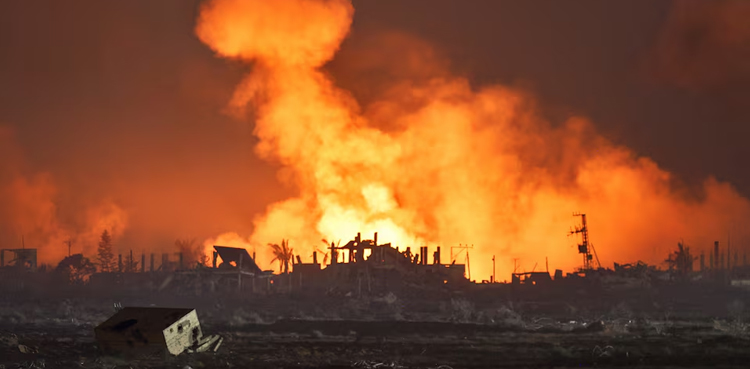United States special envoy Steve Witkoff has said he is cutting short talks aimed at reaching a truce in Israel’s war on Gaza, after the latest proposal from Hamas showed “a lack of desire to reach a ceasefire”.
Witkoff made the announcement in a statement on Thursday, just hours after the office of Prime Minister Benjamin Netanyahu said Israel had also recalled its negotiating team from Qatar amid the latest diplomatic flurry.
Hamas, which has repeatedly accused Israel of blocking a ceasefire agreement, said it was surprised by Witkoff’s remarks.
“The movement affirms its keenness to continue negotiations and engage in them in a manner that helps overcome obstacles and leads to a permanent ceasefire agreement,” said Hamas in a statement released late on Thursday.
Earlier in the day, Hamas had submitted its latest response to a ceasefire framework floated by mediators Qatar, Egypt and the US. Netanyahu’s office confirmed receipt of the response, and said it was under review. Neither side disclosed the contents.
Both Israel and Hamas are facing growing international pressure to reach an agreement as the humanitarian and hunger crisis in the territory continues to deteriorate sharply amid Israel’s severe restrictions on the entry of aid.
At least 115 people have died from malnutrition since Israel launched its war on Gaza in October 2023, mostly in recent weeks, as the United Nations and aid agencies have warned that Gaza’s residents were facing mass starvation.
“While the mediators have made a great effort, Hamas does not appear to be coordinated or acting in good faith,” Witkoff said in a statement.
“We will now consider alternative options to bring the hostages home and try to create a more stable environment for the people of Gaza,” Witkoff said, without elaborating.
Witkoff, a businessman with no formal diplomatic experience prior to his appointment, said the US remains “resolute” in seeking an end to the war in Gaza, adding it was “a shame that Hamas has acted in this selfish way”.
The current proposal under discussion has been reported to include a 60-day ceasefire in which Hamas would release 10 living captives and the remains of 18 others. In turn, Palestinians imprisoned by Israel would be released and aid supplies would be ramped up as the two sides held negotiations on a lasting truce.
Details of the current sticking point were not immediately clear, but officials from both sides have previously pointed to a dispute over what would happen in the wake of any new ceasefire.
Israel has repeatedly said it plans to deploy the military long term in Gaza, seeking a complete defeat of Hamas, despite warnings that such a goal is unrealistic.
Earlier this month, Israeli Defence Minister Israel Katz reportedly laid out a plan for the forced transfer of Palestinians to a “humanitarian city” within Gaza, a maximalist approach that critics say would violate international law.
Israel’s government has also faced domestic pressure over the plan, amid fears it would foreclose ceasefire negotiations and block the release of captives still held in Gaza.
PEPPER SPRAY FIRED AT AID SITE
Women going to fetch aid for their families on Thursday said U.S. contractors organising distribution asked them to come to pick up goods and then fired tear gas and pepper spray at them.
“The Americans said ‘go, go’, and then said no, get back. They sprayed us with pepper spray so we went away. Five minutes later they shot tear gas at us … is this American humanitarian aid?” said Mervat al-Sakani.
Asked for comment, a spokesperson for the aid organisation – the Gaza Humanitarian Foundation – said a limited amount of pepper spray was used “to prevent civilian injury due to overcrowding”, adding that GHF “didn’t want people to get hurt.” The spokesperson said women-only aid distribution had been “a major success” overall.
GHF, a U.S.-and Israeli-backed organization, began distributing food packages in Gaza at the end of May.
The U.N. has called the GHF’s model unsafe and a breach of humanitarian impartiality standards, which GHF denies.
The U.N. rights office said on July 15 it had recorded at least 875 killings within the preceding six weeks in the vicinity of aid sites and food convoys in Gaza – the majority of them close to GHF distribution points.
Most of those deaths were caused by gunfire that locals have blamed on the Israeli military. The military has acknowledged that civilians were harmed, saying that Israeli forces had been issued new instructions with “lessons learned”.
Israel, which cut off all supplies to Gaza from the start of March and reopened it with new restrictions in May, says it is committed to allowing in aid but must control it to prevent Hamas diverting it.
Israel says it has let in enough food for Gazans, and blames the United Nations for being slow to deliver it; the U.N. says it is operating as effectively as possible under conditions imposed by Israel.
The war began when Hamas killed some 1,200 people and took 251 hostages in its October 7 attacks on Israel, according to Israeli tallies. Israel has since killed nearly 60,000 innocent Palestinians in Gaza, according to Gaza health authorities.


Leave a Comment